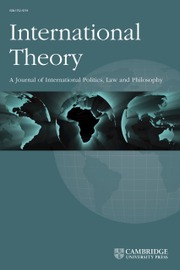-
- You have access: full
- Open access
"[By] refusing to engage in any explicit theorizing of their own, Adler and Pouliot cannot support the claim which their research program presupposes." - Erik Ringmar
In his article in the March 2014 issue of International Theory (IT), Erik Ringmar controversially critiques Emanuel Adler and Vincent Pouliot's invitation in a previous IT paper 'to students of International Relations to approach world politics through the lens of its manifold practices’.
Ringmar writes; "Accompanying Adler and Pouliot’s manifesto is an edited volume, International Practices, intended to demonstrate the relevance of practices for our analyses of international politics ... Uniformly insightful and occasionally brilliant though these chapters are, there is nothing truly new about this research. After all, practices of one kind or another are what scholars of international relations always have studied."
You can read Adler and Pouliot's article without charge here.
Ringmar's article is also available with our compliments.
More information and a 20% discount (until the end of 2014) on Adler and Pouliot's 'International Practices' can be found here where available. An eBook version is also available.
- ISSN: 1752-9719 (Print), 1752-9727 (Online)
- Frequency: 3 issues per year
International Theory is a peer-reviewed journal that publishes innovative theoretical scholarship about problems of world politics, broadly understood. The journal has three pillars: (1) explanatory, interpretive, or critical theory; (2) normative theory; and (3) international legal theory. We welcome submissions of each kind, or that cross categories. We also welcome submissions that advance our understanding of the history of the development of ideas in the study of any aspect of international politics.
While International Theory welcomes scholarship that uses empirics to advance theoretical arguments, articles whose primary focus is empirical do not fall within the journal’s remit. Nor do articles that concern only a specific country or region; that are better suited to comparative politics journals; or whose primary goal is policy advocacy or foreign policy analysis.
International Theory aims to promote communication and engagement across theoretical and disciplinary traditions. Accordingly, it puts a premium on contributors’ ability to reach as broad an audience as possible, both in the questions they engage and in their accessibility to scholars with diverse theoretical commitments or methodological approaches. While the journal is open to work that is situated within one scholarly tradition, it encourages authors to reflect on how their research relates to other work in the field more broadly.

